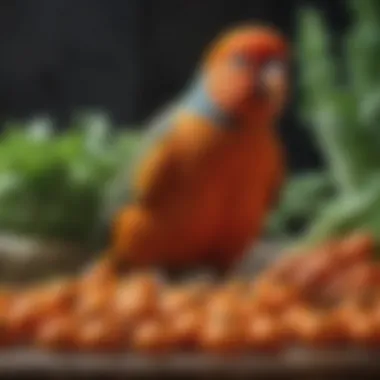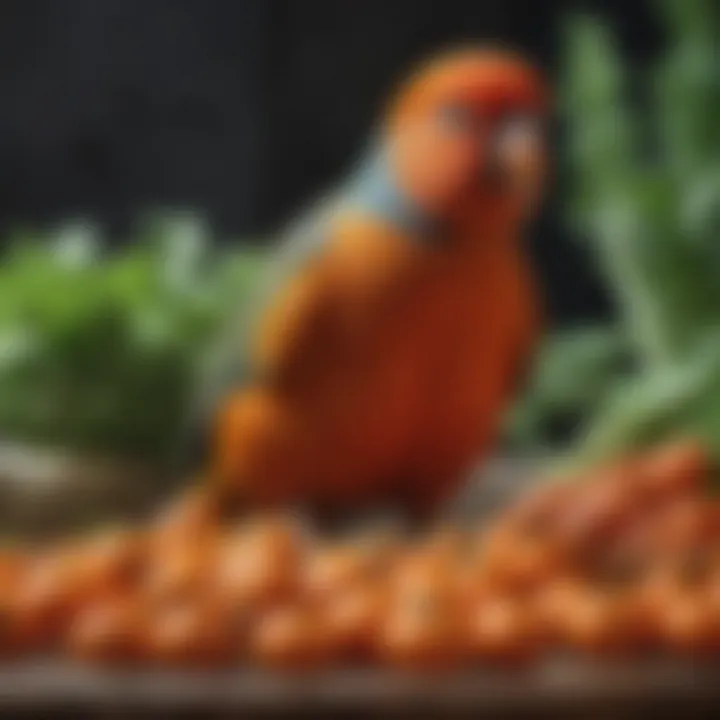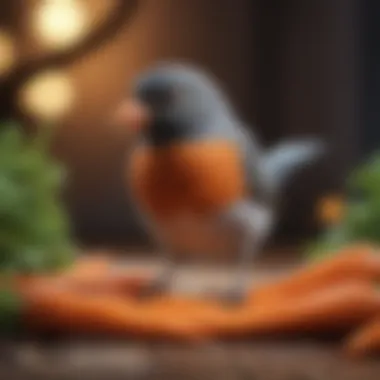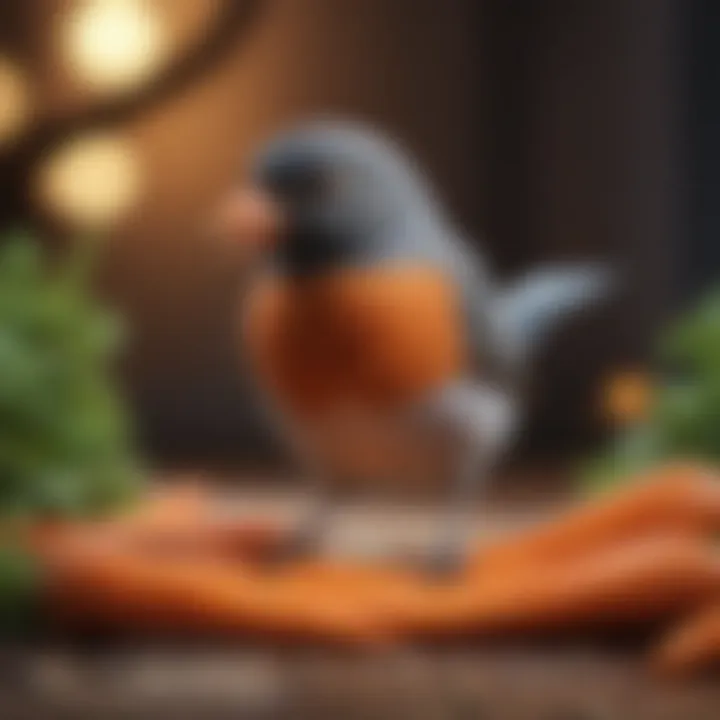Nutritional Insights: Can Pet Birds Safely Eat Carrots?


Intro
Understanding the dietary needs of pet birds is crucial for their health and happiness. Many bird owners wonder if carrots are a suitable addition to their birds’ diets. Carrots, with their bright color and crunchy texture, often catch the attention of bird owners. This article will explore the nutritional aspects of carrots and the health benefits they may provide for various bird species.
Carrots are rich in essential vitamins and minerals like vitamin A, which is vital for vision and immune function. Besides, they supply fiber, which helps in digestive health. However, it is equally important to consider how to prepare and serve carrots to avoid any potential dietary issues. Knowing each bird species's unique needs allows for tailored nutrition that supports their well-being.
In addition to carrots, this article will emphasize the importance of a balanced diet, point out any associated safety concerns, and discuss preparation methods. By educating pet bird owners, we aim to promote optimal feeding practices that ensure the overall health and longevity of their feathered companions.
Care Tips
To offer the best care for pet birds that might consume carrots, understanding basic routines and habitat maintenance is essential. A comprehensive approach will ensure their daily needs are met while introducing new foods like carrots into their diet.
Daily Care Routines
Setting a daily schedule involves regular feeding and interactions. Monitor their intake of carrots closely, and ensure that only fresh or lightly cooked carrot pieces are available. Observe their preferences, which can vary significantly between bird species. Responding to these daily habits is vital for fostering good health.
Cage Setup and Maintenance
Cage setup should support both activity and comfort. Adequate space for your bird to fly or climb allows them to use energy effectively. Carrots can dead to their enclosure as a physical toy sensory stimulation. Fresh vegetables can also be offered in safe, secure food dishes. Maintain a clean living environment by regularly changing bedding and cleaning utensils to avoid illness.
Hygiene and Cleaning Practices
Birds can be particularly susceptible to disease due to poor hygiene practices. Tables and surfaces that the birds use should be sanitized regularly. After giving carrots or any other fresh food , ensure to clean up any remaining scraps. This can curtail any unwanted pests or potential germ buildups around their environment.
Seasonal Care Adjustments
With time, birds will face changes in activity depending on the seasons. As temperatures drop in winter, diet adaptation can include warmer food preparations. Conversely, during summer, ensure that fresh vegetables like carrots remain cool to prevent spoilage, as high temperatures can quickly affect the freshness.
Nutritional Insights
When integrating carrots into a bird’s diet, awareness of essential nutrition is paramount. Recognizing the components that make up their meals contributes to lasting health.
Essential Diet Components
An optimal bird diet should consist of a variety of food types, ensuring all necessary nutrients are offered. Key components should include:
- Seeds and Grains
- Fruits
- Vegetables, like carrots
- Nuts and legumes Each category serves a specific purpose in maintaining health and providing different vitamins.
Safe and Toxic Foods
Carrots may have several health benefits, but it's imperative to be aware of other safe and toxic foods:
Safe options include broccoli, leafy greens, and bell peppers. In contrast, avocados and chocolate are on the toxic foods list.
Feeding Strategies for Different Species
Consideration of species-specific feeding strategies ensures successful integration of carrots and other new foods during feeding. Smaller birds such as parakeets, enjoy softer textures, while larger birds could manage crunchier veggie treats. Ultimately, gradual introduction is key, allowing birds time to adapt.
Carrots are a rich source of vitamins but should only be part of a managed diet.
End
Understanding Avian Nutrition
Understanding avian nutrition is crucial for the optimal health and well-being of pet birds. This section lays the foundation for comprehending how diet impacts their overall vitality. Birds have unique physiological needs. They are not small mammals; therefore, their diets should not mirror those of other common pets. Learning about avian nutrition highlights the specific elements necessary for a balanced diet and accentuates the importance of incorporating a variety of food sources like fruits and vegetables.


The intricacies of avian diets are fascinating. Many bird owners might assume that seeds form a complete diet. However, this perspective can lead to nutritional deficiencies over time. Thus, proper nutrition helps promote various health aspects. For instance, diets rich in fruits and vegetables can enhance digestive health, boost immunity, and support feather development. Focusing on the role of different food items lets pet owners make informed decisions about what they provide to their birds.
Inadequate nutrition not only impacts physical health but can also affect behavioral aspects. Birds can become overly aggressive or develop poor feather quality without the right nutritional balance. Emphasizing nutrition helps ensure that pet birds flourish. This knowledge serves as a framework for discussing whether carrots can fit into a bird's regimen, ultimately linking to larger discussions about their dietary needs and preferences.
The Role of Fruits and Vegetables
Fruits and vegetables play a vital role in providing essential vitamins and minerals needed for a healthy metabolism in birds. The consumption of these food groups encourages hydration, as many fruits have high water content. Furthermore, they contribute to a broader palate, introducing different tastes and textures that stimulate a bird's natural foraging inclinations.
Different fruits and vegetables serve distinct nutritional purposes. For example, leafy greens supply calcium and fibrous content essential for digestion, while fruits like oranges provide vitamin C. Meals that incorporate a varied selection are likely to garner interest from birds, promoting optimal feeding behaviors. Carrots offer specific advantages as well, which will be discussed in detail subsequently.
Essential Nutrients for Birds
Pet birds require essential nutrients that stem from a diversified diet. These include but are not limited to:
- Vitamins: Vital for various physiological functions and overall health. Birds need vitamin A for good vision, vitamin D for bone health, and B vitamins for energy and metabolism.
- Minerals: Calcium, particularly important for those birds that lay eggs, and other minerals like magnesium for effective muscular and cellular function, must be a part of their diet.
- Proteins: Proteins support growth, tissue maintenance, and healthy feather development. This group includes grains, legumes, and even some insects for species that eat those.
- Fats: Necessary for energy storage, but must be consumed in moderation. Birds tend to require lower amounts compared to mammals.
Failure to meet these nutritional requirements can more serious consequences and exacerbate other health issues. As such, pet owners must prioritize avian-specific dietary guidelines when selecting foods for their birds. This section serves to reinforce the groundwork necessary for understanding how carrots can be incorporated into their diets based on the specific nutritional needs of various bird species.
Carrots: A Nutritional Profile
Understanding the nutritional profile of carrots is crucial when considering their inclusion in pet birds' diets. As pet owners, we strive to provide balanced nutrition with essential vitamins, minerals, and fibers that support overall bird health. Carrots are rich in vital nutrients and can cater to various species, making them a potentially enriching addition to your avian friends' meals.
Vitamins and Minerals in Carrots
Carrots are known for being a good source of vitamin A, crucial for maintaining eye health and properly functioning immune systems in birds. This vitamin helps with vision and protects against infections. Additionally, carrots provide vitamin K, which plays a role in blood clotting and bone health. The presence of B vitamins such as B6 and folate also offers metabolic benefits, enhancing energy levels and promoting efficient utilization of nutrients.
In addition to vitamins, carrots contain minerals like potassium and manganese. Potassium supports heart health and fluid balance, while manganese contributes to bone formation and antioxidant defenses. The mixture of these nutrients establishes carrots as a nutritious option that can benefit various bird species.
Fiber Content and Digestive Benefits
The fiber content in carrots is another important characteristic to consider. Birds require dietary fiber to maintain a healthy digestive system. Carrots offer an abundance of both soluble and insoluble fiber, facilitating smooth digestion and preventing constipation. Eating carrots may promote a healthier gut flora, which is valuable for any pet bird.
Moreover, regular fiber intake can help manage weight and mitigate the risk of specific digestive ailments, aligning with the erequirements of pet birds. Providing carrots in suitable portions can ensure your avian companions enjoy their eating experience while reaping the associated health benefits.
Carrots can serve as a vibrant part of a balanced diet for pet birds, providing critical nutrients and supporting optimal digestive function.
The evidence suggests that carrots hold notable nutritional value, offering important vitamins and aiding in digestive health. It is essential to weigh these benefits against the considerations of feeding carrots to specific bird species.
Can Pet Birds Eat Carrots?
Understanding whether pet birds can eat carrots is essential for those who seek to provide the best dietary options for their feathered companions. Carrots are often seen as a healthy food option for many pets, so it raises important guideline questions. Can birds benefit from this root vegetable, and what considerations should owners keep in mind?
Carrots boast a plethora of nutrients and health advantages. They are rich in vitamins, particularly vitamin A, which mistakes high importance for avian health. Additionally, the fiber within carrots supports a bird's digestive system. However, dietary needs can differ greatly among different bird species, making species-specific knowledge critical.
In this section, we will review the various types of pet birds that often find presence in homes, the unique dietary requirements they hold, and how carrots may or may not fit into these needs.
Species-Specific Considerations
Parrots
Parrots enjoy a varied diet that mimics their natural environment, which includes many fruits and vegetables. Carrots are generally a willing addition for them due to the fiber and vitamin content. The prominent beak structure of parrots allows them to manage and consume larger pieces of carrot easily. While parrots can certainly eat carrots, it's essential not to rely solely on this food. A diverse diet enables optimum health for these intelligent birds, and carrots should only complement their main feed.
Canaries
Canaries exhibit slightly different nutritional requirements than parrots, primarily leaning towards seeds with additional dietary needs for fruits and vegetables. Carrots can indeed provide beneficial nutrients but are not the most dominant vegetables in their diet. The crunchy texture can be appealing. It can also help keep their beaks trimmed. It of importance to only provide carrots in moderation, as canaries are smaller in size which makes them sensitive to certain food components.


Finches
Finches are noted for adherence mainly to seed diets. Giving carrots to finches is possible, yet changes in consumption would rely heavily on individual preferences. The vibrant color of carrots might seem attractive, but these birds may be cautious when trying new foods. If offered, shredded or finely grates carrot may translate into a familiar presentation. It is always wise to assess the reaction of finches to new food including carrots, these strong preferences characterize much of their feeding habits.
Cockatiels
Cockatiels can safely eat carrots, as their robust and adaptable nature allows for a flexible diet. Including carrots can bring attributes such as hydration from the vegetable. The strong bite pressure and chewing ability of cockatiels mean they can tackle raw carrots effectively. Nevertheless, serving size should not overwhelm; maintaining balance while including carrots is key to prudent dietary management in cockatiels as well.
Recommended Serving Sizes
When it comes to serving carrots to pet birds, moderation count as the backbone of healthy diets. For larger birds like parrots and cockatiels, a portion ranging between one to three small carrot chunks or thin slices a few times per week can prove beneficial. For smaller birds like canaries and finches, offering a minuscule amount, perhaps a quarter of a carrot slice, is recommended once or twice each week. These recommended serving sizes help ensure the birds benefit without overwhelming their delicate digestive system.
Keeping an observant eye on dietary reactions and behaviors remains vital; adjust serving sizes as suitable for the specific needs as necessary. Always consult with an avian veterinarian before incorporating new food items.
Preparation Methods for Feeding Carrots
Preparing carrots correctly is crucial for incorporating them into a pet bird's diet. Different species of birds may have varying preferences and needs, especially when it comes to texture and taste. Understanding how to prepare carrots can enhance their nutritional benefits, make them more appetizing, and ensure safety for consumption. Proper methods of preparation contribute not only to healthy eating habits but also to the enjoyment of varied textures that birds often seek.
Raw vs.
Cooked Carrots
The choice between raw and cooked carrots significantly impacts their nutritional value and suitability for pet birds.
Raw carrots are often crisp and rich in vitamins, notably vitamin A, benefiting eye health. They provide dietary fiber that aids digestion in birds. Some bird species, particularly parrots, tend to enjoy the crunchiness of raw vegetables, making them a preferred option.
On the other hand, cooked carrots can be easier to chew for birds with softer beaks or particular types of injuries. Cooking carrots also carries the potential to increase their digestibility. However, it is essential to note that cooking may reduce the vitamin content somewhat, so it must be done carefully. Always avoid using oils or butter in preparation, as these can be unhealthy for birds.
Overall, raw carrots may be preferred for their crispness and vitamin richness, but cooked carrots present a compelling alternative if tailored to a bird species’ specific needs.
Chopping and Grating Techniques
Chopping and grating techniques play a key role in encouraging birds to consume carrots and ensuring they can easily digest them. Birds possess different beak types, which can affect how they tackle their food. Here are some effective method choices:
- Chopping: Cut carrots into small, bite-sized pieces. Chopped pieces can appeal to many birds, making it easier to access the nutrients while preventing choking hazards.
- Grating: Grated carrots allow for an alternative texture that might be welcomed by birds who prefer finer foods. When the texture changes, it might entice more curious birds to try something new.
- Mixing: Combining minced or grated carrots with other softer foods or fruits might override hesitation in trying root vegetables.
Ensure the cuts create uniform shapes to prevent confusion, landing in a pile that may otherwise deter the avian appetite. Tools like food processors or grating devices can make quick work in preparing carrots perfectly for your pet bird.
By using these techniques, bird owners can effectively present carrots to their pets, allowing for experimentation with preferences while enhancing their basic diets.
Health Benefits of Carrots for Birds
Understanding the specific health benefits of carrots for birds adds significant value to their dietary choices. Carrots offer both preventive and enhancing qualities to the overall health of avian pets. These vegetables not only contribute essential vitamins and minerals but also play critical roles in bodily functions. Delving into these benefits can help bird owners make informed decisions about the inclusion of carrots in their feathered companions' diets.
Promoting Eye Health
Carrots are well-known for their high beta-carotene content. This compound has been shown to aid in promoting eye health in many species, including birds. Beta-carotene is a precursor to Vitamin A, which is crucial for maintaining proper eyesight. Lack of Vitamin A can lead to vision problems such as poor night vision and issues with reproduction in birds.
It's essential to recognize that many pet birds may not receive adequate amounts of natural Vitamin A in their diets. Therefore, integrating carrots could serve as a beneficial supplement. Consuming carrots allows birds to obtain this nutrient in a natural form, rather than relying solely on synthetic supplements, which may not be as effectively absorbed. Ensuring that your pet bird receives adequate levels of this vitamin can be crucial in preventing long-term health problems related to eye function.
Regularly including carrots in your bird's diet might help in improving its overall vision, as proper intake of Vitamin A supports ocular health.
Boosting Immunity
Another significant benefit of carrots is their potential role in boosting the immune system of birds. A strong immune system helps birds fend off various diseases and infections. Carrots contain various antioxidants and essential vitamins that play a role in enhancing immunity.


The Vitamin C found in carrots aids in the production of white blood cells, which work against pathogens. Additionally, the fiber in carrots contributes to gut health. A healthy gut is fundamental for nutrient absorption and metabolic processes that are crucial for strong immune responses.
When considering the overall well-being of your pet bird, remember to balance its intake of carrots with other source vegetable and fruit options for a varied diet. This approach can ensure a more robust immune system for your avian friend. Including carrots can be part of an overall strategy to help maintain your pet's health and protect it from illnesses.
Potential Risks of Feeding Carrots
This section addresses the potential risks associated with feeding carrots to pet birds. While carrots are often seen as a nutritious addition to a bird's diet, there are certain considerations that owners should keep in mind. Failing to recognize these risks may lead to unintended health consequences for birds.
Pesticide Concerns
One notable concern when feeding carrots to pet birds is the presence of pesticides. Many commercial carrots are treated with a variety of chemicals during their growth cycle. While washing carrots thoroughly can help remove some pesticides, it might not eliminate all residues. To minimize chemical exposure, it is advisable to opt for organic carrots whenever possible. Organic farming typically eschews synthetic pesticides, thereby offering a safer alternative for your birds. Additionally, adopting a routine of peeling carrots can further decrease the ingestion of lingering contaminants.
- Select organic options to reduce chemical exposure.
- Always wash or peel carrots before serving them to birds.
It is essential for pet bird owners to be aware of this issue in order to create a healthier dietary environment.
Allergic Reactions in Some Birds
Allergic reactions, while not exceedingly common, can still occur in pet birds when introducing new foods, including carrots. Certain species may be more prone to these reactions, leading to various symptoms. These can include gastrointestinal distress, respiratory issues, or skin irritations. If you observe changes in your bird’s behavior or health after feeding carrots, it is advisable to cease offering them and consult with a veterinarian.
- Monitor for symptoms like vomiting or difficulty breathing after carrot consumption.
- Consult a veterinarian if any adverse reactions occur.
Alternatives to Carrots in Bird Diets
Feeding pet birds a diverse range of foods is critical for maintaining their overall health. While carrots can offer nutritional benefits, reliance on a single food may not suffice across different bird species. Therefore, exploring alternatives to carrots expands the array of nutrients found in a bird's diet. A varied feed stimulates not only nutritional intake but also helps keep a pet bird interested in its food, preventing boredom that can lead to behavioral issues.
Moreover, not all birds react the same way to carrots. Some may enjoy them, while others might not. By offering alternatives, birds can still receive essential vitamins and minerals geared toward their specific needs.
Other Vegetables to Consider
Many vegetables can be beneficial for birds, enriching their diets with essential nutrients.
- Broccoli: High in vitamins C and K, broccoli supports the immune system and promotes better eye health.
- Spinach: This leafy green is rich in iron and other vitamins, although it should be offered in moderation due to oxalates that can hinder calcium absorption.
- Bell Peppers: They provide excellent sources of vitamins A and C, as well as some exciting colors that may catch a bird's eye.
- Squash: Packed with vitamins A and C, squash also contributes a different texture to the diet, which can enhance chewing and enjoyment.
When introducing new vegetables, make sure to cut them into manageable sizes for the birds to eat. Observing how your pet reacts to these alternatives will lead to a better understanding of its preferences.
Complementary Fruits
In addition to vegetables, fruits play an indispensable role in diversifying a bird's diet.
- Apples: Sweet and crunchy, apples are a great choice due to their fiber and vitamin content. Remove seeds first, as they contain cyanide.
- Blueberries: These berries are low in sugar yet rich in antioxidants, contributing to overall health while providing hydration.
- Bananas: A favorite for many avian species, bananas are high in potassium and simple carbohydrates but should be fed in moderation due to sugar content.
- Mango: Offering rich flavors, mango contains vitamins A, C, and E. Its juicy texture might encourage birds to explore various textures in their diet.
Providing these and other fruits allows a bird to benefit from various nutrients while keeping mealtime interesting. The goal is to achieve balance and variety that aligns with the bird's dietary requirements.
Ultimately, exploring a mix of vegetables and complementary fruits can significantly benefit your pet bird's nutritional intake while catering to their taste preferences.
End
In this article, we have examined the various dimensions surrounding the question of whether pet birds can safely consume carrots. The exploration delves not just into the nutritional benefits, but also into the preparation requirements, feeding guidelines, and the potential concerns that each bird owner should be aware of.
Understanding the importance of balanced diets should resonate with all pet bird owners, as every species has its unique dietary needs. Including carrots as a variable can offer essential vitamins and minerals that are vital for the health of many birds. Their vibrant color and crunchy texture may also provide sensory stimulation for your avian friends.
However, the importance of mindful preparation cannot be overlooked. It's crucial that bird owners recognize the significance of rinsing carrots to remove any harmful pesticides. Chopping or grating them into manageable pieces can prevent choking hazards, making for an enjoyable feeding experience.
Beyond the positives, it's equally critical to weigh the risks, such as possible allergic reactions or gastrointestinal discomfort. Pedantic checking for species suitability ensures a safe addition to your birds' menus; different types of birds, such as parrots, canaries, finches, and cockatiels, may have divergent disease susceptibilities.
Lastly, this examination raises awareness by highlighting alternatives to carrots. Offering a diverse range of vegetables and fruits provides holistic nutrition.
In brief, adequately understanding the nuances of birds' dietary needs, particularly concerning carrots, allows pet owners to make informed enhancements to their birds' nutrition while also fostering a deeper bond through thoughtful feeding practices. Ignoring these elements may lead to unintentional adverse effects, thus solidifying the conclusion that awareness, attention, and a thoughtful approach to feeding contribute not just to a healthier pet, but also an enriched relationship between owner and companion.
Always choose fresh and organic when possible for the best health outcomes.















